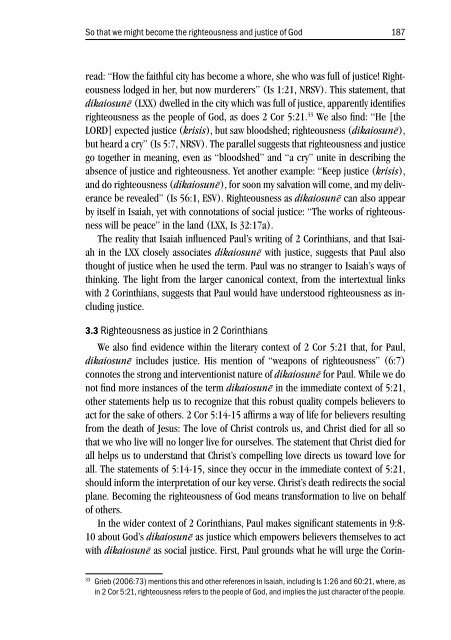Acquiesce to Righteousness
Acquiesce to Righteousness
Acquiesce to Righteousness
You also want an ePaper? Increase the reach of your titles
YUMPU automatically turns print PDFs into web optimized ePapers that Google loves.
So that we might become the righteousness and justice of God 187<br />
read: “How the faithful city has become a whore, she who was full of justice! <strong>Righteousness</strong><br />
lodged in her, but now murderers” (Is 1:21, NRSV). This statement, that<br />
dikaiosunē (LXX) dwelled in the city which was full of justice, apparently identifies<br />
righteousness as the people of God, as does 2 Cor 5:21. 33 We also find: “He [the<br />
LORD] expected justice (krisis), but saw bloodshed; righteousness (dikaiosunē),<br />
but heard a cry” (Is 5:7, NRSV). The parallel suggests that righteousness and justice<br />
go <strong>to</strong>gether in meaning, even as “bloodshed” and “a cry” unite in describing the<br />
absence of justice and righteousness. Yet another example: “Keep justice (krisis),<br />
and do righteousness (dikaiosunē), for soon my salvation will come, and my deliverance<br />
be revealed” (Is 56:1, ESV). <strong>Righteousness</strong> as dikaiosunē can also appear<br />
by itself in Isaiah, yet with connotations of social justice: “The works of righteousness<br />
will be peace” in the land (LXX, Is 32:17a).<br />
The reality that Isaiah influenced Paul’s writing of 2 Corinthians, and that Isaiah<br />
in the LXX closely associates dikaiosunē with justice, suggests that Paul also<br />
thought of justice when he used the term. Paul was no stranger <strong>to</strong> Isaiah’s ways of<br />
thinking. The light from the larger canonical context, from the intertextual links<br />
with 2 Corinthians, suggests that Paul would have unders<strong>to</strong>od righteousness as including<br />
justice.<br />
3.3 <strong>Righteousness</strong> as justice in 2 Corinthians<br />
We also find evidence within the literary context of 2 Cor 5:21 that, for Paul,<br />
dikaiosunē includes justice. His mention of “weapons of righteousness” (6:7)<br />
connotes the strong and interventionist nature of dikaiosunē for Paul. While we do<br />
not find more instances of the term dikaiosunē in the immediate context of 5:21,<br />
other statements help us <strong>to</strong> recognize that this robust quality compels believers <strong>to</strong><br />
act for the sake of others. 2 Cor 5:14-15 affirms a way of life for believers resulting<br />
from the death of Jesus: The love of Christ controls us, and Christ died for all so<br />
that we who live will no longer live for ourselves. The statement that Christ died for<br />
all helps us <strong>to</strong> understand that Christ’s compelling love directs us <strong>to</strong>ward love for<br />
all. The statements of 5:14-15, since they occur in the immediate context of 5:21,<br />
should inform the interpretation of our key verse. Christ’s death redirects the social<br />
plane. Becoming the righteousness of God means transformation <strong>to</strong> live on behalf<br />
of others.<br />
In the wider context of 2 Corinthians, Paul makes significant statements in 9:8-<br />
10 about God’s dikaiosunē as justice which empowers believers themselves <strong>to</strong> act<br />
with dikaiosunē as social justice. First, Paul grounds what he will urge the Corin-<br />
33<br />
Grieb (2006:73) mentions this and other references in Isaiah, including Is 1:26 and 60:21, where, as<br />
in 2 Cor 5:21, righteousness refers <strong>to</strong> the people of God, and implies the just character of the people.

















